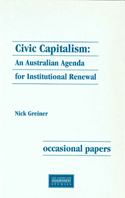
A new political middle ground is forming around the idea that successful societies depend on ‘social capital’- the goodwill, trust and sense of mutual obligation that underpin co-operation and community. Nick Greiner argues that social capital producing institutions are voluntary, collaborative, and capable of responding quickly to changing needs and circumstances. He supports his case with the insights of social theorists and examples from Australia and overseas.
This finding adds to our growing awareness of the importance of a healthy civil society. The non-state institutions of civil society are important not just because they are usually more efficient than government agencies, but also because they often display those characteristics which add to our stock of social capital.
The term civic capitalism emphasises that markets can work only within a wider network of social institutions and that successful businesses display many of the attributes of social capital producing institutions.










